Did you know that Bongbong Marcos, the son of the late dictator Ferdinand Marcos, is one of the most prominent political figures in the Philippines? With a remarkable political journey and a family legacy that sparked both adoration and controversy, Marcos has emerged as a formidable candidate for the presidency.
In this article, we will delve into the life, career, and policies of Bongbong Marcos, exploring his upbringing, political aspirations, and the impact he has made on the nation. Join us as we uncover the story behind his rise to power and examine the implications of his presidency for the future of the Philippines.
Key Takeaways:
- Bongbong Marcos, the son of late President Ferdinand Marcos, is a prominent political figure in the Philippines.
- His political journey has been shaped by his family legacy and controversial history.
- Marcos has presented a range of platforms and policies in his presidential campaign.
- He achieved a landslide victory in the presidential election.
- Marcos’ leadership approach and governance style have garnered both praise and criticism.
Biography of Bongbong Marcos
The biography of Bongbong Marcos provides insights into his early life, education, and his path to politics shaped by his family legacy and initial roles.
Early Life and Education
Born on September 13, 1957, Ferdinand “Bongbong” Romualdez Marcos Jr. hails from a prominent political family in the Philippines. He is the second child of former President Ferdinand Marcos and former First Lady Imelda Marcos. Growing up in the midst of political turmoil, Bongbong experienced both the privileges of being part of the ruling family and the challenges brought by his father’s controversial regime.
Bongbong obtained his primary and secondary education at St. Vincent Ferrer School in New York City, United States. He later pursued a Bachelor’s degree in Philosophy, Politics, and Economics (PPE) at the University of Oxford, one of the world’s most prestigious universities.
Path to Politics: Family Legacy and Initial Roles
Bongbong Marcos’ journey into politics was influenced by his family’s political legacy. His father, Ferdinand Marcos, served as the President of the Philippines from 1965 to 1986. Despite the controversies surrounding his father’s rule, Bongbong embraced his family’s political heritage and sought to follow in his father’s footsteps.
Before diving into national politics, Bongbong started his political career as Governor of Ilocos Norte, a position he held from 1983 to 1986. This role allowed him to gain firsthand experience in governance and establish his political presence in his home province. Bongbong’s governance in Ilocos Norte was characterized by various development initiatives and infrastructure projects, positioning him as a competent leader with a vision for progress.
Following his stint as Governor, Bongbong embarked on a career in national politics. He served as a Member of the Philippine House of Representatives from 1992 to 1995, representing the Second District of Ilocos Norte. Later, he served as a Senator from 2010 to 2016, during which he advocated for various laws and policies aimed at fostering national development and addressing social issues.
| Political Roles | Years |
|---|---|
| Governor of Ilocos Norte | 1983-1986 |
| Member of the Philippine House of Representatives | 1992-1995 |
| Senator | 2010-2016 |
Political Journey to the Presidency
Bongbong Marcos embarked on a remarkable political journey that paved the way for his bid for the presidency. Throughout his career, Marcos has held various government positions, honing his leadership skills and garnering support from the Filipino people.
With the political legacy of his family playing a significant role, Marcos entered the political arena determined to continue the Marcos name in public service. His vision and ability to articulate his policies resonated with the electorate, positioning him as a formidable contender.
One of the key milestones in Marcos’ political journey was his election as a member of the Philippine House of Representatives, representing the second district of Ilocos Norte. This platform allowed him to directly engage with his constituents and address their concerns, further solidifying his grassroots support.
As his career progressed, Marcos expanded his influence and impact by serving as Governor of Ilocos Norte. During his tenure, he implemented various development programs and initiatives, showcasing his commitment to uplifting the lives of his constituents.
“My primary goal is to serve the Filipino people, to ensure their welfare and prosperity. I believe in a strong and united Philippines, and I am dedicated to making that vision a reality,”
Marcos emphasized during one of his public addresses.
Another significant milestone in Marcos’ political journey was his election as a Senator of the Philippines. In this role, he focused on addressing pressing national issues, advocating for legislative reforms, and championing policies that prioritize the welfare of the Filipino people.
Marcos’ dedication to public service and his ability to connect with different sectors of society have undoubtedly played a crucial role in propelling him towards the presidency. His political journey has positioned him as a viable candidate capable of leading the country.
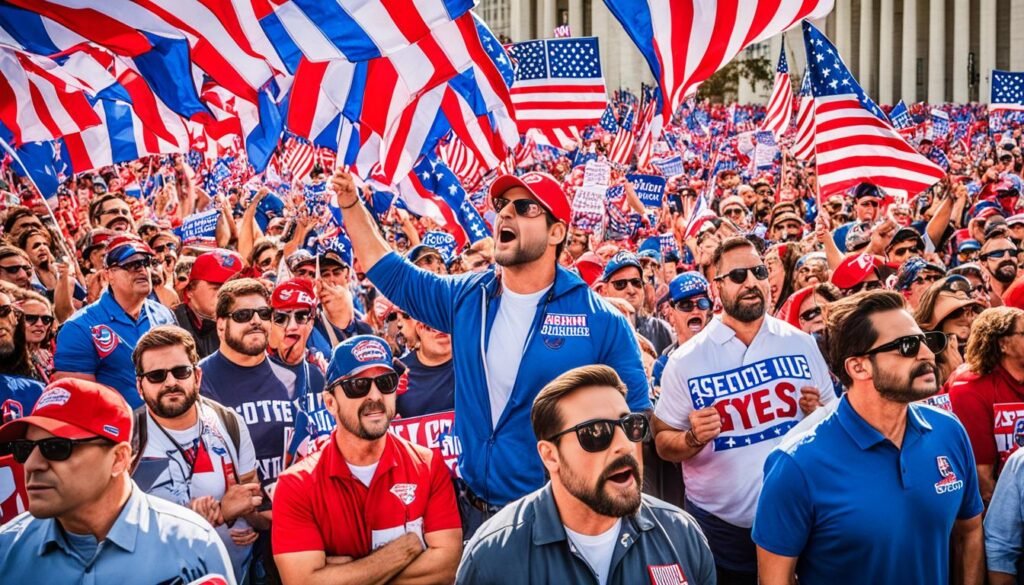
As Marcos continues to campaign for the highest office in the land, he brings with him a wealth of experience and a clear vision for the future of the Philippines. The next section will delve into the platforms and policies that Marcos has proposed for his presidential campaign.
The 2022 Presidential Campaign: Platforms and Policies
As Bongbong Marcos embarked on his journey to secure the presidency of the Philippines in the 2022 elections, he presented a comprehensive set of platforms and policies aimed at addressing the pressing issues and improving the lives of Filipinos.
Central to Marcos’ campaign was his commitment to economic development and job creation. He pledged to implement policies that would attract foreign investments, boost domestic industries, and create sustainable employment opportunities for the people of the Philippines.
Recognizing the importance of education in shaping the nation’s future, Marcos proposed initiatives to enhance the quality of education and increase access to educational opportunities for all. His vision encompassed reforms in curriculum, teacher training, and infrastructure development to ensure that every Filipino child can receive a quality education and have a chance at a brighter future.
Healthcare was another key area of focus for Marcos. He vowed to prioritize the improvement of the country’s healthcare system, with a particular emphasis on accessibility and affordability. His proposed policies aimed to address gaps in healthcare services, ensure universal healthcare coverage, and enhance the overall well-being of Filipinos.
Recognizing the potential of renewable energy sources, Marcos advocated for the development of clean and sustainable energy solutions to address the growing energy demands of the country. He aimed to reduce reliance on fossil fuels and promote the use of renewable energy technologies, positioning the Philippines as a regional leader in sustainable energy practices.
Furthermore, Marcos placed a strong emphasis on strengthening national security and promoting peace and order. He proposed policies to enhance the capabilities of the armed forces and law enforcement agencies, as well as foster cooperation among neighboring countries to address security challenges in the region.
These platforms and policies formed the cornerstone of Bongbong Marcos’ presidential campaign, resonating with a wide range of voters across the Philippines. It remains to be seen how these promises will translate into action and impact the country if he were to ascend to the presidency.
Presidential Election and Inauguration
After an intense and closely watched presidential campaign, Bongbong Marcos emerged as the victor in a historic landslide election. The Filipino people placed their trust in Marcos, electing him as the 17th President of the Philippines.
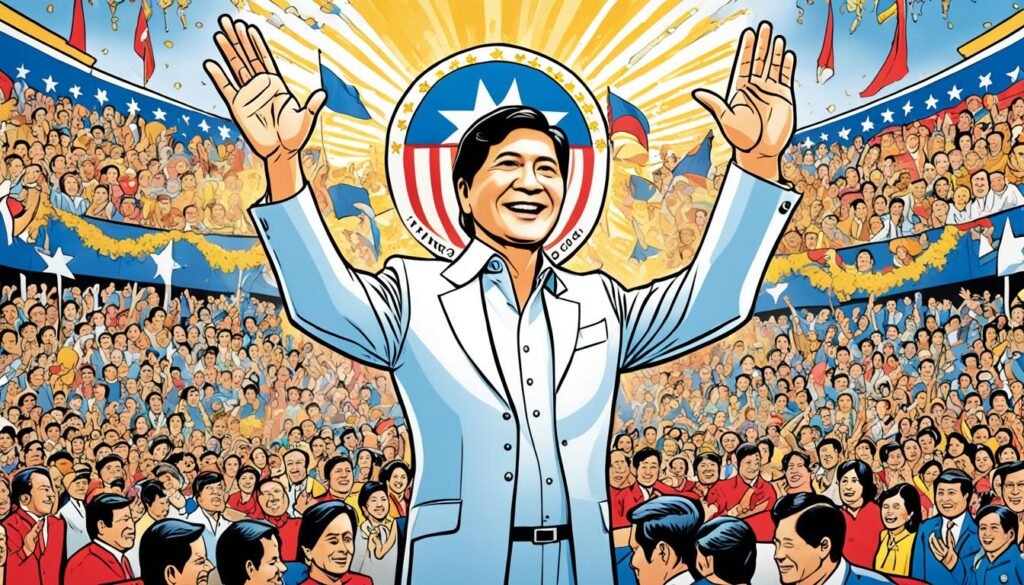
Landslide Victory
Marcos’s victory in the presidential race was a testament to his appeal and the support he garnered from the populace. With a significant majority of the votes, he established a mandate for his administration’s policies and governance.
Key Inauguration Moments
The inauguration ceremony marked a significant milestone in the nation’s history. It was a moment filled with anticipation and hope as Bongbong Marcos took the oath of office, pledging to uphold the constitution and serve the Filipino people.
During his inauguration speech, Marcos outlined his vision for the country, emphasizing his commitment to strengthening the economy, addressing social issues, and promoting unity among the diverse communities of the Philippines.
Furthermore, the inauguration witnessed the presence of notable dignitaries, both national and international, who came to congratulate and extend their well wishes to the newly elected President.
Leadership Approach and Governance Style
One of the key aspects of Bongbong Marcos’ presidency is his distinctive leadership approach and governance style. Known for his pragmatism and strong decision-making abilities, Marcos has been praised for his ability to navigate complex political landscapes and address pressing challenges with strategic solutions.
At the core of Marcos’ leadership approach is a focus on economic development and infrastructure projects aimed at boosting the country’s growth and improving the lives of its citizens. His administration has prioritized investment in key sectors such as infrastructure, agriculture, and technology, with the goal of creating a conducive business environment and generating employment opportunities.
Marcos adopts a hands-on approach to governance, actively engaging with various stakeholders and seeking their input and feedback. He believes in inclusive decision-making processes and values collaboration and consultation. Through his open-door policy, Marcos encourages dialogue and ensures that diverse perspectives are taken into account when formulating policies and implementing reforms.
In terms of governance style, Marcos is known for his strong leadership and effective communication skills. He is a firm believer in transparent and accountable governance, and has implemented measures to enhance government efficiency and combat corruption.
Furthermore, Marcos places great emphasis on investing in education and healthcare, recognizing them as crucial components for human development and social progress. His administration has introduced various initiatives and programs aimed at improving access to quality education and healthcare services, particularly in marginalized communities.
Overall, Bongbong Marcos’ leadership approach and governance style exemplify his commitment to driving economic growth, fostering inclusive development, and ensuring transparent and accountable governance. His strategic vision and decisive actions have positioned him as a leader capable of addressing the nation’s challenges and steering the Philippines towards a prosperous future.
Bongbong Marcos in the Face of National Challenges
As the 17th President of the Philippines, Bongbong Marcos faced numerous national challenges during his administration. From economic reforms to addressing the COVID-19 pandemic, Marcos tackled these issues with determination and a vision for a better future.
One of the key challenges that Bongbong Marcos confronted was revitalizing the country’s economy. Through various economic initiatives and reforms, his administration aimed to stimulate growth, attract investments, and create job opportunities for the Filipino people. The goal was to build a more prosperous and resilient nation.
In the face of the COVID-19 pandemic, Marcos took decisive actions to protect the health and well-being of the Filipino population. He implemented comprehensive measures to control the spread of the virus, including widespread testing, vaccination campaigns, and support for healthcare infrastructure. The aim was to mitigate the impact of the pandemic and ensure the country’s swift recovery.
Furthermore, Bongbong Marcos focused on strengthening social welfare programs to alleviate poverty and promote inclusivity. His administration prioritized initiatives such as education reforms, healthcare accessibility, and poverty reduction measures. These efforts aimed to uplift marginalized sectors and provide equal opportunities for all Filipinos.
Addressing environmental challenges was also a priority for Marcos. His administration advocated for sustainable development and conservation of natural resources. Efforts were made to combat climate change, promote renewable energy, and protect the country’s rich biodiversity.
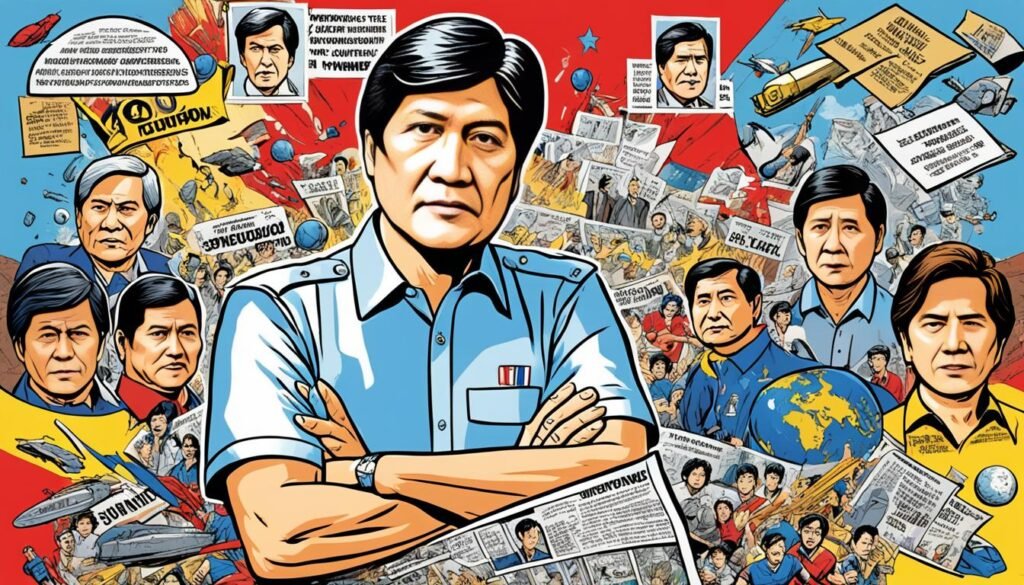
Bongbong Marcos demonstrated strong leadership and a commitment to the welfare of the Filipino people during his presidency. Through his policies and actions, he aimed to overcome national challenges and build a brighter future for the Philippines.
Domestic Policies and Achievements
Bongbong Marcos is widely recognized for his range of domestic policies and achievements that have shaped the Philippine society. As the 17th President of the Philippines, Marcos implemented various economic initiatives and reforms, which revitalized the nation’s economy and improved the standard of living for many Filipinos.
One of the key highlights of Marcos’ economic initiatives was the establishment of sustainable development programs aimed at reducing poverty and unemployment rates. His administration introduced policies that promoted job creation, entrepreneurship, and investment, resulting in the expansion of industries and increased employment opportunities.
To ensure a robust and inclusive economy, Marcos focused on developing key sectors such as agriculture, manufacturing, and tourism. He implemented comprehensive reforms that enhanced agricultural productivity, supported local industries, and promoted the country as a premier destination for tourism.
In addition to economic initiatives, Marcos was widely applauded for his proactive approach in addressing the COVID-19 pandemic. Recognizing the severity of the global health crisis, he swiftly implemented measures to safeguard the well-being of the Filipino people.
Marcos’ administration successfully ramped up testing and contact tracing efforts, established quarantine protocols, and ensured the timely distribution of vaccines and essential medical supplies. These proactive measures greatly contributed to mitigating the impact of the pandemic on public health and the economy.
Economic Initiatives and Reforms
Under Marcos’ leadership, the Philippines witnessed significant economic growth and stability. His administration implemented a comprehensive set of economic initiatives aimed at boosting productivity, attracting investments, and reducing poverty.
Some notable economic reforms implemented during his tenure included:
- Market-oriented policies to attract foreign investments
- Streamlining bureaucracy and reducing red tape to promote ease of doing business
- Increasing infrastructure spending to enhance connectivity and stimulate economic growth
- Improving transparency and accountability in government procurement
- Implementing tax reforms to create a more equitable and sustainable tax system
These initiatives played a crucial role in transforming the Philippine economy, leading to increased foreign direct investments, higher GDP growth, and improved living conditions for many Filipinos.
Addressing the COVID-19 Pandemic
The COVID-19 pandemic posed significant challenges for the Philippine society, but under Marcos’ leadership, the country effectively navigated through the crisis. His administration implemented a comprehensive set of measures to address the health and economic impact of the pandemic.
Key initiatives undertaken to address the challenges posed by the COVID-19 pandemic included:
- Implementing widespread testing and contact tracing measures
- Strengthening healthcare systems and ensuring the availability of medical facilities and supplies
- Enforcing strict quarantine protocols and travel restrictions
- Rolling out a comprehensive vaccination program to achieve herd immunity
These efforts played a significant role in safeguarding public health, mitigating the economic impact, and helping the Philippines recover from the pandemic.
| Domestic Policies and Achievements | Summary |
|---|---|
| Economic Initiatives and Reforms |
|
| Addressing the COVID-19 Pandemic |
|
Foreign Policy and International Relations
As the 17th President of the Philippines, Bongbong Marcos has placed significant emphasis on shaping the country’s foreign policy and strengthening its international relations. His approach to foreign affairs has been characterized by strategic decision-making and a commitment to safeguarding the Philippines’ national interests.
Stance on South China Sea Disputes
One of the key challenges faced by President Marcos in the realm of foreign policy is the ongoing disputes in the South China Sea. Recognizing the geopolitical significance of these disputes and their potential impact on regional stability, President Marcos has taken a firm stance in defending the Philippines’ territorial integrity and maritime rights.
“The Philippines stands firm in asserting its sovereign rights over the South China Sea. We will not back down in the face of external pressure and will utilize all diplomatic channels to peacefully resolve these disputes.”
President Marcos has actively pursued diplomatic negotiations and strengthened partnerships with neighboring countries and international organizations to find peaceful and lasting solutions to the South China Sea disputes. His commitment to upholding international law and promoting a rules-based approach has garnered support and recognition from the international community.
Partnerships and Military Alliances
Recognizing the importance of strategic partnerships and military alliances in advancing national security and promoting peace in the region, President Marcos has focused on strengthening cooperation with key countries and organizations.
Under his leadership, the Philippines has deepened its engagement with traditional allies such as the United States and other regional partners like Japan and Australia. This has resulted in increased military collaboration, joint exercises, and capacity-building initiatives, aimed at enhancing the country’s defense capabilities and ensuring regional stability.
President Marcos has also pursued closer economic cooperation with neighboring countries through initiatives like the Association of Southeast Asian Nations (ASEAN) and regional free trade agreements. By fostering economic integration and promoting trade partnerships, he aims to harness the collective strength of ASEAN member states and create a more prosperous and interconnected region.
In summary, President Bongbong Marcos has prioritized foreign policy and international relations as key pillars of his administration’s agenda. Through his firm stance on South China Sea disputes and proactive engagement with partners, he has sought to protect the Philippines’ territorial integrity, promote regional stability, and advance the country’s interests on the global stage.
Controversies and Public Opinion
The presidency of Bongbong Marcos has not been without controversy. As a prominent political figure, Marcos has faced scrutiny and criticism from various sectors of society. These controversies have had a significant impact on public opinion surrounding his leadership and the direction of the country.
One of the major controversies that has surrounded Marcos is his family’s political legacy. The Marcos family, particularly his father Ferdinand Marcos, was associated with authoritarian rule and allegations of human rights abuses during their time in power. This legacy has continued to shape public perception of Bongbong Marcos and has been a point of contention for many Filipinos.
Another controversy that has garnered attention is Marcos’ stance on issues related to the South China Sea disputes. Some have criticized his handling of this sensitive and complex issue, questioning his commitment to safeguarding Philippine sovereignty and protecting national interests.
Furthermore, Marcos’ political opponents have raised concerns about his alleged involvement in corruption and his close ties to certain business interests. These allegations have fueled public distrust and have raised questions about the integrity and transparency of his administration.
“The controversies surrounding Marcos have sparked intense debates and discussions across the country. They reflect the deep divisions within Philippine society and highlight the importance of accountability, transparency, and good governance in the eyes of the Filipino people.”
Despite these controversies, Marcos does have a significant base of support. Some Filipinos view him as a capable leader who can bring stability and economic progress to the nation. Others argue that he deserves a chance to prove himself and that his family’s past should not overshadow his own merits and accomplishments.
Public opinion regarding Marcos and his presidency remains divided, with passionate arguments on both sides. As the tenure of Bongbong Marcos unfolds, it will be crucial to monitor how these controversies and public opinion continue to shape the social and political landscape of the Philippines.
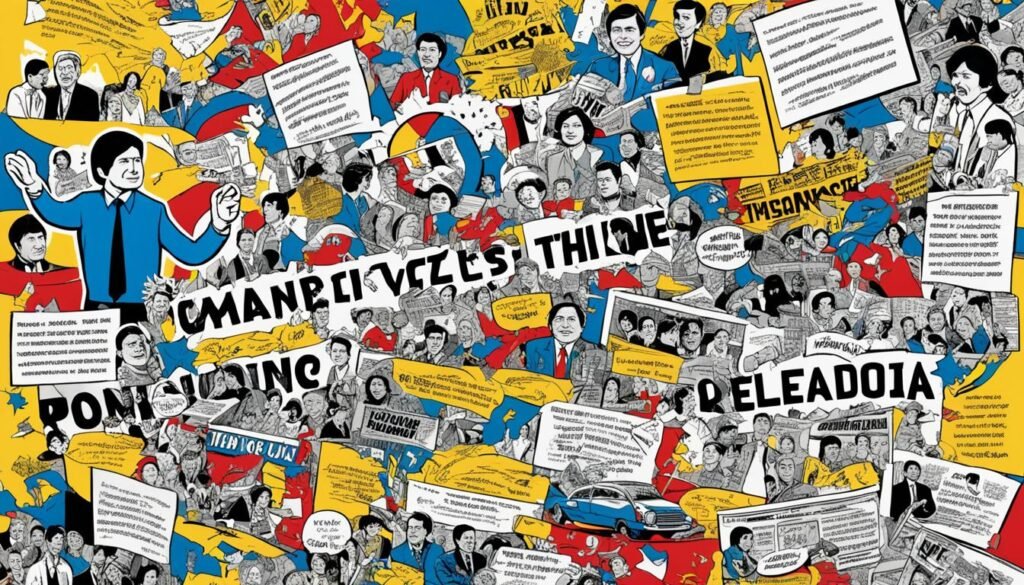
Family Influence and National Perception
Throughout the political journey of Bongbong Marcos, his family’s influence has played a significant role in shaping both his career and his public image. The Marcos family, with its storied history in Philippine politics, has left behind a lasting legacy that continues to impact the perception of Bongbong Marcos in the eyes of the nation.
The Marcos Family Legacy
The Marcos family is synonymous with the martial law era in the Philippines, which was marked by both progress and controversy. Bongbong Marcos is the son of the late Ferdinand Marcos, the 10th President of the Philippines. During his father’s regime, the country experienced economic growth, infrastructure development, and increased international recognition. However, the Marcos regime was also marred by allegations of human rights abuses, corruption, and authoritarian rule.
Despite the controversies surrounding his family’s reign, Bongbong Marcos has sought to emphasize the positive aspects of his father’s legacy. He often highlights the economic achievements and nation-building initiatives that occurred during his father’s time in office. Marcos supporters argue that his family’s leadership laid the groundwork for progress and stability, thereby contributing to the development of the Philippines.
Revival of the Marcos Image
In recent years, there has been a notable resurgence in public interest regarding the Marcos family. The younger generation, largely disconnected from the martial law era, is more open to reassessing the Marcos legacy. This shift in perception has been fueled by various factors, including nostalgia, curiosity, and political alliances.
Bongbong Marcos has capitalized on this renewed interest by actively engaging with the public through social media, public appearances, and political campaigns. He has positioned himself as a dedicated advocate for inclusive growth, unity, and national progress. By focusing on his own political agenda and distancing himself from the controversies of the past, Marcos aims to redefine the Marcos family image and present himself as a leader capable of guiding the Philippines to a brighter future.
By leveraging his family name and the renewed interest in the Marcos legacy, Bongbong Marcos has managed to generate considerable support among certain segments of the population. However, it is important to note that the perception of the Marcos family and its influence remains a contentious topic among Filipinos. While some view Bongbong Marcos as a promising leader with the potential to revitalize the nation, others harbor deep reservations due to their personal experiences or the historical narrative surrounding the Marcos regime.
In the next section, we will explore Bongbong Marcos’s role on the global stage, highlighting his international engagements and the impact of his foreign policy decisions.
Bongbong Marcos on the Global Stage
Bongbong Marcos’s presidency has not only impacted the Philippines but also positioned the country on the global stage. With his strong leadership and diplomatic approach, Marcos has fostered international relationships and actively participated in global affairs.
One significant area where Marcos has made his mark is in economic diplomacy. Being aware of the importance of foreign investments and trade partnerships, Marcos has actively engaged with other countries to expand opportunities for the Philippines. His administration has worked towards strengthening economic ties with established allies and forging new partnerships with emerging economies.
With his unwavering stance on national sovereignty and the rule of law, Marcos has played a key role in representing the Philippines in international forums. He has been vocal about the country’s territorial rights in the South China Sea and has actively sought peaceful resolutions to disputes through diplomatic channels.
To further enhance the country’s global standing, Marcos has focused on strengthening military alliances and partnerships. By collaborating with defense forces from other countries, the Philippines has been able to enhance its defense capabilities and contribute to regional security efforts.
“Building strong relationships with other nations is crucial for the Philippines’s success in the global arena. We must work hand in hand with our international partners to address common challenges and seize opportunities for growth and prosperity,” said Marcos.
Marcos’s international engagements have not only brought diplomatic successes but have also showcased the Philippines as a significant player on the world stage. As the 17th President of the Philippines, Marcos has leveraged his global presence to advance the country’s interests, promote peace and stability, and secure a prosperous future.
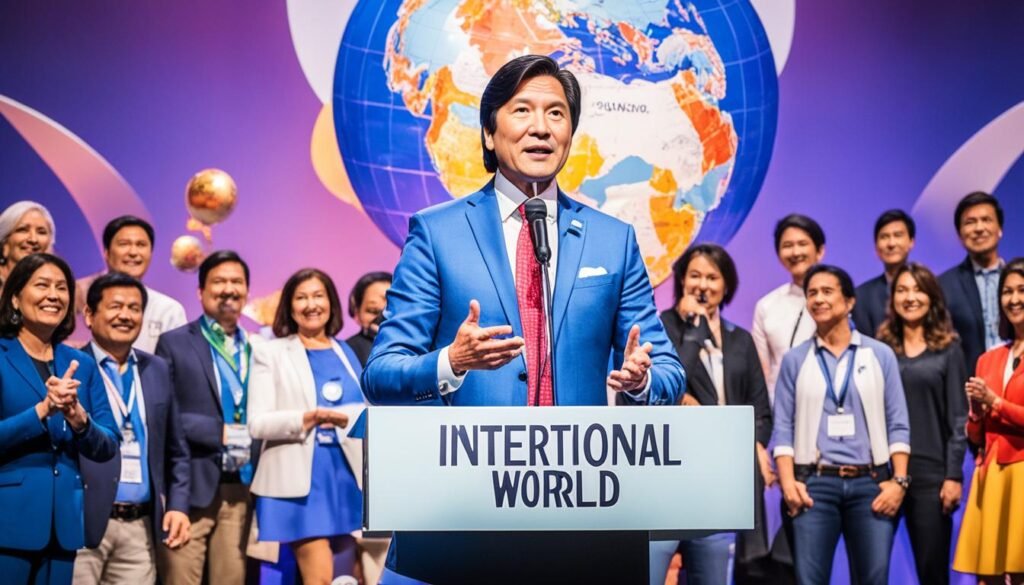
Administration’s Future and Legacy
The future of Bongbong Marcos’ administration holds significant implications for the Philippines and its people. As the 17th President of the country, Marcos has outlined policy directions and a national vision that aims to shape the nation’s future. Through his leadership and governance style, he seeks to leave a lasting legacy that will have long-term impacts on various aspects of Philippine society.
Policy Directions and National Vision
Under Marcos’ administration, several key policy directions have been prioritized to drive the country forward. These include economic initiatives and reforms, addressing the COVID-19 pandemic, strengthening domestic security, and advancing diplomacy and international relations. By focusing on these areas, Marcos aims to foster sustained economic growth, improve public health and welfare, and enhance the Philippines’ standing in the global community.
Long-term Impacts and Projections
The policies and actions implemented by Marcos’ administration are projected to have notable long-term impacts on the Philippines. Through his economic initiatives and reforms, he aims to create a favorable business environment, attract foreign investments, and generate employment opportunities for Filipinos. Additionally, the administration’s efforts in addressing the COVID-19 pandemic are expected to strengthen public health systems and improve the overall resilience of the nation in the face of future health crises.
“Bongbong Marcos’ administration seeks to leave a lasting legacy through its policy directions and national vision, aiming to propel the Philippines towards progress and prosperity.” – Political Analyst
Furthermore, Marcos’ commitment to strengthening domestic security and advancing diplomacy and international relations is anticipated to bolster national defense capabilities, ensure peace and stability within the region, and enhance the Philippines’ influence on the global stage. These efforts, coupled with Marcos’ leadership approach and governance style, are expected to shape the future trajectory of the nation and leave a lasting imprint on its political, social, and economic landscape.
| Policy Directions | Projected Impacts |
|---|---|
| Economic initiatives and reforms | Improved business environment, increased investments, and job creation |
| Addressing the COVID-19 pandemic | Strengthened public health systems and enhanced resilience |
| Strengthening domestic security | Heightened national defense capabilities and improved public safety |
| Advancing diplomacy and international relations | Enhanced regional stability and increased global influence |
Overall, the future of Bongbong Marcos’ administration holds great promise and potential for the Philippines. With its policy directions, national vision, and long-term impacts, his leadership aims to chart a course towards a prosperous and resilient nation, leaving behind a legacy that will shape the Philippines for generations to come.
Conclusion
In conclusion, Bongbong Marcos has emerged as a prominent figure in Philippine politics, serving as the 17th President of the country. Throughout his political journey, he has demonstrated the influence of his family legacy and implemented various platforms and policies during his 2022 Presidential campaign.
With a leadership approach and governance style that prioritizes economic initiatives and reforms, Marcos has tackled national challenges, including the ongoing COVID-19 pandemic. His administration’s domestic policies and achievements have aimed to enhance the country’s economy and address crucial societal issues.
On the global stage, Marcos has adopted a distinct foreign policy stance regarding the South China Sea disputes and forged partnerships and military alliances. However, controversies and public opinion surrounding his family influence and the revival of the Marcos image have persisted throughout his tenure.
Looking ahead, the future of the Marcos administration remains uncertain, but its policy directions and national vision continue to shape the country’s landscape. The long-term impacts and projections of Marcos’s presidency will serve as a crucial aspect of his legacy, influencing the Philippines for years to come.
FAQ
Who is Bongbong Marcos?
Bongbong Marcos is the 17th President of the Philippines.
What is the biography of Bongbong Marcos?
Bongbong Marcos had an early life and education that shaped his path to politics.
What roles did Bongbong Marcos have before entering politics?
Bongbong Marcos had various roles due to his family legacy before venturing into politics.
How did Bongbong Marcos embark on his political journey towards the presidency?
Bongbong Marcos had a political journey that led him to the presidency.
What were Bongbong Marcos’ platforms and policies during the 2022 presidential campaign?
Bongbong Marcos had specific platforms and policies during his campaign for the presidency in 2022.
How did Bongbong Marcos achieve a landslide victory in the presidential election?
Bongbong Marcos achieved a significant victory in the presidential election.
What were some key moments during Bongbong Marcos’ inauguration?
Bongbong Marcos had memorable moments during his inauguration as the President of the Philippines.
What is Bongbong Marcos’ approach to leadership and his governance style?
Bongbong Marcos has a particular approach to leadership and a distinct governance style.
How did Bongbong Marcos handle national challenges?
Bongbong Marcos faced various national challenges and had his approach in handling them.
What were some of Bongbong Marcos’ domestic policies and achievements?
Bongbong Marcos implemented specific domestic policies and achieved noteworthy accomplishments.
What were Bongbong Marcos’ economic initiatives and reforms?
Bongbong Marcos introduced economic initiatives and implemented reforms during his presidency.
How did Bongbong Marcos address the COVID-19 pandemic?
Bongbong Marcos had a specific approach in addressing the COVID-19 pandemic during his presidency.
What is Bongbong Marcos’ stance on the South China Sea disputes?
Bongbong Marcos has a particular stance on the contentious South China Sea disputes.
What are some of the partnerships and military alliances Bongbong Marcos established?
Bongbong Marcos forged partnerships and established military alliances with certain countries.
What controversies surround Bongbong Marcos, and how is he perceived by the public?
Bongbong Marcos has been involved in controversies and is perceived differently by the public.
What influence does the Marcos family have, and how does it affect Bongbong Marcos’ national perception?
The Marcos family has a significant influence, impacting how Bongbong Marcos is perceived nationally.
What is the Marcos family legacy, and how has Bongbong Marcos revived their image?
The Marcos family has a distinct legacy, and Bongbong Marcos has worked towards reviving their image.
How does Bongbong Marcos participate on the global stage?
Bongbong Marcos plays a role on the global stage in various capacities.
What are Bongbong Marcos’ policy directions and national vision for his administration?
Bongbong Marcos has specific policy directions and a national vision for his administration.
What are the long-term impacts and projections of Bongbong Marcos’ administration?
Bongbong Marcos’ administration is expected to have long-term impacts and projections.
Source Links
- https://www.britannica.com/biography/Bongbong-Marcos
- https://en.wikipedia.org/wiki/Presidency_of_Bongbong_Marcos
- https://en.wikipedia.org/wiki/Bongbong_Marcos

